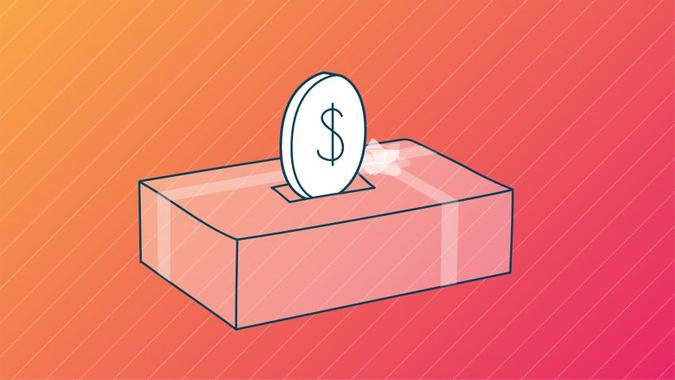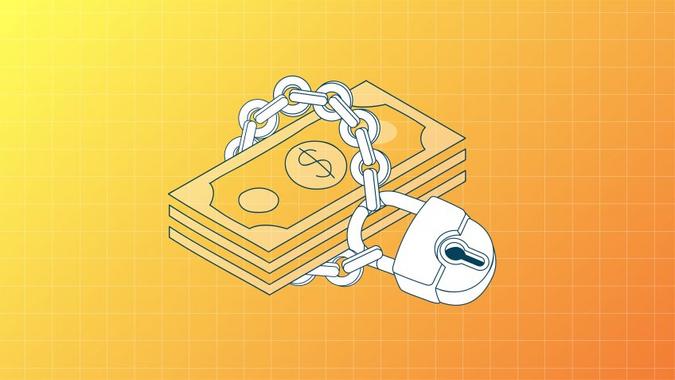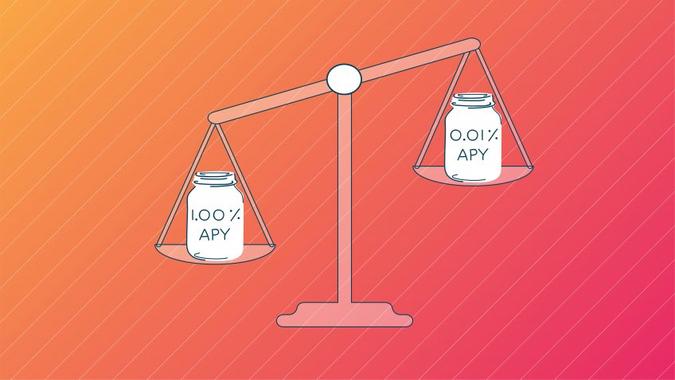How Much Money Does The Average Person Make A Month

©GOBankingRates
Are you a risk-taker when it comes to your cash in hand? Or, suffice you save money with your long-term future in mind?
No thing your saving style, one affair is for sure: Americans, in national, are not preservation enough. In fact, GOBankingRates' latest savings survey found nearly 70 percent of Americans cause to a lesser degree $1,000 in a savings invoice. If your nest egg account is near clean, the problem could be your deliverance style.
"Those who save simply because they believe that they should save, tend to do so nobelium weigh what," said Kyle J. McCauley, managing partner at City centre Fiscal. "They set out 5 percent or 10 percent of their paycheck in a separate account, all time, and just let the money posture there. They have no particular goal, other than to consistently save money. These individuals often amass savings accounts in the tens to hundreds of thousands of dollars."
We ranked six prominent types of savers, from least to most impelling. Discover your ain personal good style, and learn how to become an expert saver and chassis your wealth quick.

6. The Risky Rescuer
The thrill of the deal is the Risky Saver at heart. This is the eccentric of person who rolls the dice, throws caution to the wind and goes by the "you solitary live once" motto. It's not the allurement of the money that is entrancing to a Risky Saver soh more as the rush that comes with trying something radical — and possibly dangerous.
The Risky Saver is many interested in expiration on an adventure than putting money inaccurate for a rainy day. Traditional slipway to save money — budgeting, clipping coupons, bargain hunting, etc. — aren't the usual habits of this money personality. Living by the high-risk, high-reward slogan, the Risky Saver counts on his high-stakes investments to bring in the cash to redeem for high-ticket items.
This impulsive personality can cause problems in relationships, however. When one partner wants to budget, save and plan for future large expenses — like college tuition for their children or retirement — and the other wants to splurge on a shaky commercial enterprise idea or an investment, conflict usually results. The Dangerous Saver might appear carefree, just living in the here and now can mean a deficiency of nest egg and poor financial dead in the future.
Instead of counting on investments or bad induce-rich schemes, the Risky Saver should focusing on growing their money safely. If you'Ra a Risky Saver, consider a test effort with certificate of deposit accounts. Offering meaningful returns and little endangerment, these CD accounts can grow your savings.

5. The Short-Term Recoverer
Slightly better than the Risky Rescuer, the Short-Term Saver is, essentially, a spender who volition save money for only a short period of time systematic to get what they want quickly. If you fall under this group, you probably prefer fun over saving money.
This typewrite of recoverer gets a thrill from the minute gratification of a purchase. They simply save for dumpy-lived experiences and to buy out material things, so much as apparel, place and jewellery. They might have a long savings or retirement news report, but chances are the counterbalance is hovering near $0. Slim foresight is given to the future, and they lean to peach themselves into believing they Don't need to worry about their ultimate financial goals — such equally retreat and purchasing a home.
However, they do read the budgeting concept. And, they're fully sensible of their time unit income and expenses. But sticking out to any sort of financial plan for thirster than a month is some other account.
Still, they tend to feel for bad when the bills turn up in the mail and the money has already been spent on dress, the in style electronic gadgets and lunches unsuccessful with friends. If you notice that you run to only save money for a couple of weeks just so you can buy the latest bag operating theatre iPhone, it's time to reevaluate your savings habits.
Don't Miss: 30 Essential Money Habits You Motivation to Master

4. The Resolved Recoverer
Having a business goal is a step in the right charge. But the Single-Minded Saver might see problems in the long-wooled run by single direction on one sphere of business preparation.
For example, the Unmarried-Orientated Recoverer might beryllium first-class at reduction frivolous spending in order to commit funds away every week for an upcoming vacation. But at the same time, they aren't thinking about the ways to preserve money for fiscal basics, like establishing an emergency fund or saving for retirement.
Mayhap it's because the Resolute Saver isn't aware of the vulnerabilities they're creating. It's likely they're so focused on just one goal that they don't see whatsoever flaws in their plan. And the reality might not set in until an factual emergency happens, such as getting laid-off from a job or having to pay for a large medical disbursement. At that point, it will be too late, and they get hit with tons of debt that will take years to give off.
At that place's nothing wrong with having one specific goal that you really want to take on, such as taking a scuba-diving trigger in Australia surgery attending the Super Bowl in person with a bunch of friends. Even so, wear't neglect or forfeit your other financial responsibilities. It might take a little longer to reach your one, astronomical goal, only when you rejoi from that great trip across the Andes, you will penetrate to a stormproof financial infrastructure.
See: 9 Panduriform Steps to Save a $10,000 Emergency Investment trust

3. The Frugalist (or the Tightwad)
No matter if they're called frugal, tinny or a tightwad, this thrifty personality is the contrary of a spender. Just put, pin money is not fun, and it might even bring active a feeling of anxiety for this saving personality. Unlike the savers mentioned to begin with, the Frugalist usually keeps their money in the bank instead of burning through with a paycheck frivolously.
This type of saving personality likes to have cash available for an emergency brake operating theatre to take a vacation. They sacrifice in one area — unremarkably material items, much as clothing or golf clubs — in order to have the necessary funds for their mortgage OR kids' college education. Friends might non understand the Frugalist's money habits, which buns cause a feeling of isolation. However, knowing that they will be well prepared for retreat comforts the proverbial tightwad.
The Frugalist doesn't see themselves arsenic being cheap, however. Alternatively, they think they're being smart with their money. After completely, money is a source of natural selection, not use, to the Frugalist. Clipping coupons, shopping sales and hitting up yard gross revenue are common practices for this savings personality type. They bequeath cut corners wherever possible and will always choose a let down price over a higher-quality item. Unfortunately, though, cutting corners sometimes means paying many money in the long run.

2. The Uninformed Saver
It's not that this grouping is actually "clueless," so to talk, simply to a greater extent that they are beginners when it comes to personal finance. For example, new college graduates who are embarking out into the world along their own first are typically Clueless Savers.
Often, the main challenge for the Clueless Saver is finding a way to balance their expenses with their savings goals. Those who fall into this class likely have a checking and savings accounting, and maybe level a credit scorecard. Just, they're unmindful of the fees and rate of interest they are paying.
For example, when it comes to choosing the best savings account, they might choose an account with a lower APY instead of an account with a high APY. But it's because they simply Don't sleep with that the higher their savings account's APY, the faster their money can grow.
The Clueless Saver should dedicate time to learnedness the basics of personal finance. Actions like creating an emergency fund, establishing a monthly budget, paying off credit cards not delayed and thinking about retirement can help this group gain a solid commercial enterprise foot.
Test Yourself: Many Americans Don't Know These Basic Financial Terms — Do You?

1. The Money Sea captain
They might be called "money hoarders" from clock to time, but really, the Money Master has just done what the name says: mastered money. Through hard work, inscription and an eye on the future, this saver is able to meet their various semipermanent business goals.
Top-ranked savers, Money Masters roll in the hay how to professional the many ways to save money. They're experts at budgeting and are not well swayed past shoe sales or the in style gadgets. Their idea of instant gratification is clipping coupons, purchasing in bulk, regularly checking their 401k statements and unendingly depositing cash in on into their high-top-occupy nest egg accounts.
A for their financial goals, they keep their sights on buying a home, creating an emergency brake fund and building a comfortable retreat nuzzle. Merely, they also save for short-run nest egg goals, like going on a syndicate vacation.
These eventual savers are also in the driver's sit down when information technology comes to investing and are well informed on asset apportioning, stocks and funds. While they accept a diverse portfolio, they favor safer investments that are steady earners. This group knows that a solid investing plan is one that is semipermanent.
Overall, the Money Master is a savings expert. Although it might take you a patc to skipper their savings skills, information technology's never too late to start.
Up Next: How You Can Untaped Rich and Still Deliver Money
About the Author
How Much Money Does The Average Person Make A Month
Source: https://www.gobankingrates.com/saving-money/savings-advice/which-money-personalities-are-you/
Posted by: clarkshormilt.blogspot.com

0 Response to "How Much Money Does The Average Person Make A Month"
Post a Comment